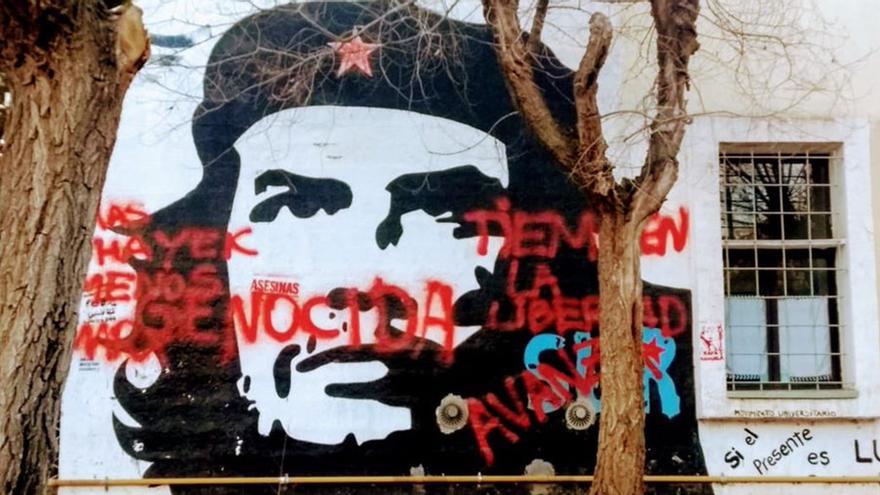
![]() 14ymedio, Havana, July 30, 2021 – “They tremble, freedom advances.” The phrase appeared this Friday on the face of Ernesto “Che” Guevara painted on a mural at the National University of Comahue, in the province of Neuquén, Argentina. The young human rights activist Agustin Antonetti shared on his Twitter account an image of the graffiti, which also contained the word “Genocide” and the phrase “More Hayek, less Marx.”
14ymedio, Havana, July 30, 2021 – “They tremble, freedom advances.” The phrase appeared this Friday on the face of Ernesto “Che” Guevara painted on a mural at the National University of Comahue, in the province of Neuquén, Argentina. The young human rights activist Agustin Antonetti shared on his Twitter account an image of the graffiti, which also contained the word “Genocide” and the phrase “More Hayek, less Marx.”
The Argentine, who studies International Relations at the Inter-American Open University of Rosario and frequently criticizes the human rights violations committed by the Cuban regime, wanted to record in his publication the meaning of what happened: “A great change is taking place in young people and it shows.”
“We are seeing a gigantic change in the mentality of young people in Latin America, although in many universities they are pressured by professors not to speak; now is the time for us to accompany them and promote them. A change has already begun and there will be no turning back,” Antonetti, who is also coordinator of the Youth Group of the Freedom Foundation, added in the Twitter thread.
Antonetti is one of the human rights activists who has most echoed the denunciations of the repression carried out by the Cuban regime against the July 11 protesters. On the same social network, he has shared the many reactions of Cubans both inside and outside the island, of governments and organizations, and in addition he has issued alerts about the hundreds of detainees and “disappeared” after the protests.
Also in Argentina, a group of young people from the group “Alternative” that belongs to the Faculty of Political Sciences of the National University of Rosario, is promoting an initiative to revoke the title of “illustrious citizen of Rosario” to Che Guevara. “Out with the dictator,” they argue via the citizengo.org platform and also affirm that they support “the fight of the Cuban people for freedom.”
The promoters of the initiative note that while in Cuba “there is no free expression, basic goods are scarce, and 51% of the population lives in poverty, in Argentina the authoritarian leaders who plunged Cuba into this chaos are honored and worshiped.”
Meanwhile in Spain, the Zaragoza city council approved this week, in an extraordinary session, that “Che Guevara” Street be renamed after Ana María Suárez (a Zaragozan victim of the 2017 jihadist attack in Catalonia), and that “Guevara” Park take the name of the Paralympic athlete Teresa Perales.
The announcement was made during the debate on a motion of the Popular Party (PP) and Ciudadanos (Cs), in charge of the municipal government, to condemn the Cuban regime’s repression against civil society demonstrations and to defend a transition towards democracy on the island.
A week earlier, in Galicia, more than fifty people gathered in front of the statue of Che Guevara located in a roundabout in Oleiros to demand the removal of this figure, and freedom for Cuba. The attendees, assembled by the Patria y Vida platform, where the Association of Victims of Castroism is located, exhibited Cuban, Spanish, and Venezuelan flags, as well as banners that read SOS Cuba, and also chanted slogans such as Viva Cuba libre, We want freedom! and Homeland and Life.
In Mexico, after the 11J (11 July) protests, several politicians resumed the debate to remove the sculpture in the capital that portrays Fidel Castro and Che Guevara seated together.
“It must be withdrawn. Last year the PAN (National Action Party) presented a resolution to withdraw it because the two characters were human rights violators, and are responsible for the misery in which the Cuban people find themselves. They are dictators that led a people to be prisoners of the elite that controls power and the economy,” said the deputy of the Congress of Mexico City, América Rangel.
Another member of PAN, Diego Garrido, spoke with Rangel, and agreed, according to Sé Uno, that the Cuban regime is repressive and that it violates the human rights of its own people. “They’ve kept their people in extreme poverty, in conditions of misery. Hundreds of people flee the island every year, so it is absurd that they have statues to commemorate these characters.”
Translated by Tomás A.
____________
COLLABORATE WITH OUR WORK: The 14ymedio team is committed to practicing serious journalism that reflects Cuba’s reality in all its depth. Thank you for joining us on this long journey. We invite you to continue supporting us by becoming a member of 14ymedio now. Together we can continue transforming journalism in Cuba.
